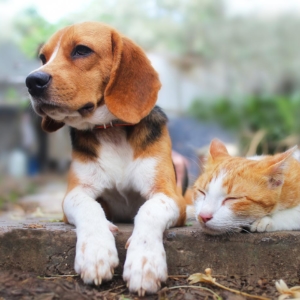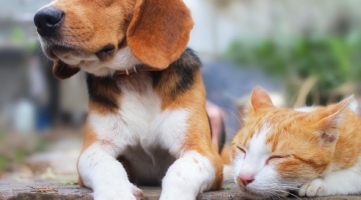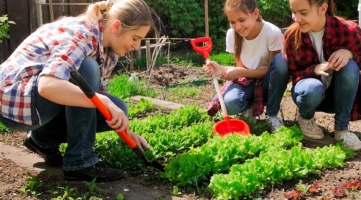Get your pets involved in sustainable living
We want the very best for our pets and the planet too so it’s good to know that we can achieve both with a few easy choices.
We are all much more eco-conscious than just a few short years ago and studies have shown that our pets make a big impact on the environment so it’s not surprising that we’re looking for ways to get them involved in sustainable living.
And the changes we make don’t have to be disruptive. A few small adjustments is all it takes to keep your pets happy and make a big difference to the environment.
Food for thought
One of the biggest impacts on the planet are the sources of food. We want to give our pets the best because we love them so much but with a little careful thought we can reduce environmental effects and keep them happy and healthy.
Pet food accounts for around a quarter of the environmental impacts of meat production in terms of the use of land, water, fossil fuels, phosphates, and pesticides1. And this is further driven by the growing habit of offering choice cuts of red meat or fish.
These have a much higher environmental impact but there is no scientific evidence that they are healthier for dogs and cats. It’s more eco-friendly to choose pet foods made from meat by-products, offal, chicken, or rabbit.
We know that cats must have a meat-based diet to survive and thrive. While dogs can manage without meat protein, we need to make sure they have the right balance of nutrients, through a comprehensive mixed diet.
Making sustainable choices
When choosing sustainably sourced food brands remember that chicken has a lower carbon impact than beef and check that food made with fish is certified by the Marine Stewardship Council, which ensures that it is sustainably fished. More commercial pet foods are now use insect protein, which is more sustainable.
There are also recycling schemes for cat food pouches in the UK3 and you can always switch to tinned cat food, while buying dry food in bulk is often cheaper with less waste in the long run.
Another option is to make your own pet food but it’s definitely worth consulting your vet before your make any changes to the diet. You can also reduce eco-impacts by making your own pet treats and there are plenty of recipes and tips online2. This sustainable do-it-yourself choice reduces waste from packaging and avoids use of ingredients like environmentally damaging palm oil.
Whatever you choose, it’s good to ensure you weigh out food accurately to reduce waste and ensure your pet is suitably nourished.
It’s also good to invest in sustainable, plastic-free accessories like the Beco Pets Bamboo Dog Bowl and Beco Pets Bamboo Cat Bowl. These food and water bowls are manufactured using a combination of bamboo, corn starch and rice husks, a natural by-product from rice farming, and will last for years.
Planet-friendly pick-up
Cleaning up pet poop is nobody’s idea of fun but it’s a labour of love and essential to keep the local ecology in good shape. Pet waste harbours disease and through runoff can pollute water systems and coastal areas, which has an impact on wildlife.
The single best eco-friendly switch you can make is to buy biodegradable waste bags. The standard single-use plastic bags fill landfills and pollute the seas, harming birds and marine life – and they take hundreds of years to biodegrade.
Ditch those and buy compostable bags like the Beco Pets Home Compostable Poop Bags. These are made from corn starch, which is converted into polymers, so the bags have the same strength as plastic with none of the carbon footprint.
Investing in a Beco Pets Bamboo Poop Bag Dispenser also makes good eco-sense. It’s lightweight and made from a combination of bamboo, corn starch and rice husks, a natural by-product from rice farming. More sustainable but as strong and durable as plastic, the material will decompose naturally when finally disposed of.
Cat litter
Much of the cat litter available is produced using silica clay, which has a big environmental impact as the strip mining processes used can destroy local environment, displace wildlife through habitat loss and contaminate water tables.
Standard cat litter has also been linked to health problems as the silica and chemical-laden dust that can be toxic to humans and animals. It’s clearly better to choose eco-friendly options made from safe and degradable wood shavings, recycled newspaper, and fibrous material from renewable wheat, maize and tree-nut crops.
Chemistry lessons
We all want the best for our loving pets so want to keep them clean, free of ticks and fleas and smelling good. But it’s a fact that many sprays and repellents as well as shampoos and conditioners, contain chemicals and nerve agents that can not only be harmful to our pets but also to wildlife, while environmental runoff and chemical pollution can also affect rivers and seas.
It’s good to use eco-friendly alternatives including flea combs and D-limonene and linalool citrus extracts as well as organically-made shampoos and sprays that are non-toxic and free of dyes and parabens. You could even try making your own using non-toxic ingredients such as castile soap, vinegar or olive oil.
But it’s worth bearing in mind that most dogs will be happier with fewer baths, and often just using water. That certainly will save on the use of any eco-friendly, recyclable shampoos while also helping to prevent skin irritations.
Sustainable fun
We’re seeing rapid growth in the pet toy market with even more electronic toys for dogs and cats, including devices that guzzle electricity all day. It’s a natural thought to want to buy the best for your pets but digital toys are no guarantee of fun and lasting happiness! These devices have an environmental price, from the plastic used to the electricity consumed so it makes more eco-sense to choose from the many sustainable options.
Well-chewed plastic toys can quickly end up in landfills where they’ll never decompose but it’s easy enough to choose toys made from natural fibres and recyclable materials like durable, non-toxic, recyclable plastic, hemp and certified materials.
Pets love old-fashioned stuff like balls, string or chews while many firms also sell toys, beds and other supplies made from reclaimed or sustainable products. You can also make your own from existing clutter. We sometimes forget that a simple ball of foil on a string can fascinate and distract the cat for hours while dogs just love a tug-o’-war with an old towel.
Preventive medicine
It’s also worth keeping in mind that regular check-ups at the vets for preventive treatments like as vaccination and worming also helps to reduce environmental impacts, avoiding the high carbon cost of treating some conditions.
Make sure you hang onto any treatment product, like a neck cone or a splint, or pass them onto a friend. These can be shared and reused many times, with the right hygiene and care.



